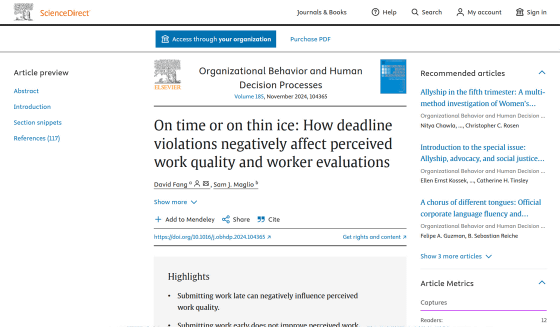It turns out that work or artwork that is completed late receives lower evaluations than those that are completed on time, even if the content is the same.

Deadlines are a part of everyday tasks, such as school homework and work submissions, but many people have missed deadlines for various reasons. A study conducted by researchers at the University of Toronto and Stanford University found that even if the submitted work or job is of the same quality, people will give it a lower rating if it is 'late.'
On time or on thin ice: How deadline violations negatively affect perceived work quality and worker evaluations - ScienceDirect

Researchers find missing deadline has a more negative impact than you might think — for you and your work | University of Toronto Scarborough News
https://utsc.utoronto.ca/news-events/breaking-research/researchers-find-missing-deadline-has-more-negative-impact-you-might-think-you
Experiments Reveal What Happens When You Hand in Work Late : ScienceAlert
https://www.sciencealert.com/experiments-reveal-what-happens-when-you-hand-in-work-late
A research team led by Sam Mario, a professor of marketing and psychology at the University of Toronto, conducted an experiment to examine the impact of whether a work or submission was submitted by deadline on the evaluation of its content. Mario said, 'All the studies we found looked at how deadlines affect the mind and behavior of workers. What we wanted to know was, how do deadlines affect the mind and behavior of others?'
The research team conducted a total of 18 experiments with various scenarios, involving a total of 6,982 subjects. The subjects included corporate managers, executives, human resources personnel, and others whose job it is to evaluate others, and they were asked to evaluate a variety of items, including advertising flyers, artwork, business proposals, product sales pitches, photographs, and news articles. In the experiment, subjects were also given information about when the work or submission was submitted relative to the deadline.
The results showed that late submissions were consistently rated as 'lower quality' compared to submissions that were submitted on time, even if the content was identical. 'Everyone was looking at the exact same art competition submissions, school handouts, business proposals -- and yet we couldn't help but use knowledge of when it was received to help us evaluate it,' Mario said.
In the graph below, the vertical axis shows the score that evaluated the work or submission, and the horizontal axis shows the timing of submission relative to the deadline. Compared to the cases where the deadline was met, such as '1 Day Early' and 'Morning of', the evaluation dropped sharply after '1 Hour Later'.

The study also found that if a paper was submitted before the deadline, whether it was submitted a few days before or just before the deadline, there was no significant difference in the evaluation. And if the paper was submitted late, whether it was submitted a day or a week after the deadline, the evaluation was just as negative.
The tendency for employees to be rated lower when they missed a deadline was true even if the employee had told them in advance that they would not be able to meet the deadline. In addition, even employees who had always met deadlines received lower ratings from the subjects after missing a deadline just once.
When an employee missed a deadline, participants perceived the employee as less conscientious and were less likely to assign tasks to that employee in the future. The researchers say this could limit employees' opportunities to prove their worth and get promoted.
In one experiment, students at a Chinese high school were asked to evaluate artwork submitted to an art contest. They were told to ignore any information other than the artwork itself, but artwork that was submitted late still received lower ratings. This experiment suggests that the effects of missing deadlines transcend language, age, and culture, and may be similar even for people who were not involved in setting the deadline.

The negative impact of missing a deadline was mitigated to some extent when there was a valid reason for the deadline being missed. For example, if there was a reason beyond the subject's control, such as 'I had to appear in court because I was selected as a juror for a trial,' the subjects did not view the deadline as negative. Also, if they were told that 'the deadline or the work itself was not important,' the negative impact on the evaluation was not as great.
'Communication about deadlines is very important. If it's a hard deadline, the manager should let the employee know. If the reason for missing the deadline is outside of their control, the employee should let their manager know,' Mario said.
Related Posts:
in Science, Posted by log1h_ik







